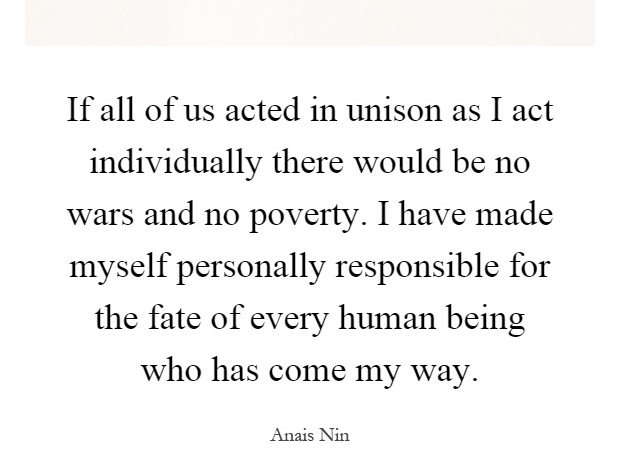
The headlines that tease us about another “world war”? It’s not about them—“the other”—it’s about us.
It’s about you—and me.
The external war might all be our fault. We might be to blame—in our comfortable homes, with our eyes buzzing with the glare of the smartphones we spend half the day on. (Hard to admit that one, isn’t it?) We caused it. We are to blame.
The blame we can place on ourselves doesn’t have to be filled with shame, simply because we’re all at fault. It’s no particular person. It’s beyond the scope of age, gender, race, faith, or ability.
There once lived a man who took a stand in a country on the brink of war with itself. He spoke of changing the world, but not with external, group-driven action. This humble, gentle soul spoke of making changes by being them. He spoke of individuals taking responsibility for their own thoughts, feelings, and actions—and shifting them in accordance with their values. He valued peace—and I do too.
This man’s statement, “be the change you wish to see in the world,” was not a passive set of words. Gandhi spoke of the flexible nature of being human. Change, like human emotion, is not static. Change is a dynamic, fluid state.
You are I, we are a lot more flexible and adaptable than we sometimes believe.
To this day, we can still look back and see how one man made a tidal wave—not only in his country, but in the collective. If he could do it—why can’t I? Why can’t you?
In order to make the shift so many of us desire to make in the wounded psyche of the world, we must go within and ask a hard question: how am I still at war with myself?
We might feel an urge to expand this out to: how am I still at war with the world.
And the “victim self” might feel pressured to ask: how is the world still at war with me?
But to be the change, we must keep bringing it back to self. The war—it’s not out there. You and I both know it, if not consciously, unconsciously.
The war—it’s already happening. Only you have the power to call a truce, and that takes work.
Yes, my friend, we are in this together. You and I—we are both still fighting those inner wars.
They happen in those fleeting moments when our thoughts slam us into a wall with a choke hold. They happen when we can’t accept compliments and thrive off of criticisms. The war happens when we look in the mirror and feel disappointment, sadness, or disgust.
The war is happening when we look on social media and feel lesser than our friends. The war—it was pushed on us when we were tiny, squirming, crying little humans looking for nourishment—and sometimes not getting our needs met because our caregivers were at war with themselves too.
My friend, the world inside is so delicate. The world outside mirrors that vulnerable, fragile (sometimes miserable) self.
The light of truth is sometimes painful, but as we allow it to shine on our dark, vulnerable corners, we soften.
And we don’t have to soften alone.
Together, we can ask: how am I still at war with myself?
And if it feels more comfortable to process our answers together, then we can do so. This is not a solo journey. A world where some feel we’re on the brink of war takes a world where no one feels on the brink of war to mend it.
It starts here. It starts now, with a deep breath and the flashlight of an honest question.
You can handle the answers. After all, you’ve been in the middle of an inner war all your life. Let down your weapons and open your heart to the wounded soldiers within—they need your sustenance.
The wounds, they need the delicate fragrance of your blooms. The blooming takes strength—a vulnerability. You have it. We all have it. Behind the choke holds of our violent thoughts, there lies a crying baby. Feed that nascent self. Hold it. Sing to it. The strength becomes you when you give over to that wise, intuitive self.
“And the day came when the risk to remain tight in a bud was more painful than the risk it took to blossom.” ~ Anaïs Nin
~
Relephant:
How to Stop being at War with your Mind (& Start Living a Rich, Fulfilled Life).
~
Author: Sarah Theresa
Image: author’s own; memesville
Editor: Yoli Ramazzina
Copy editor: Catherine Monkman










Read 0 comments and reply